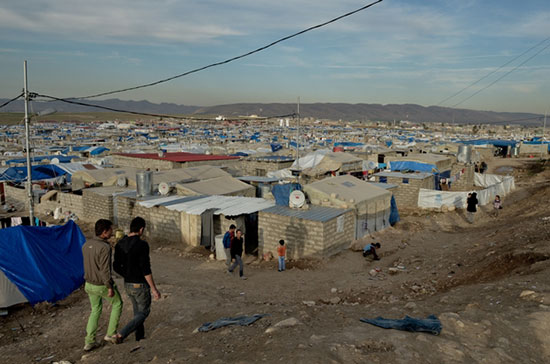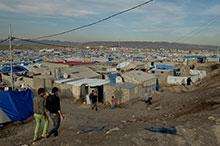
Iraq 2013 © Pierre-Yves Bernard/MSF
MSF is providing humanitarian assistance to Syrian refugees in Domeez camp through general health and mental health care and immunization.
Overcrowding and poor living conditions in Iraq’s Domeez camp have led to a recent deterioration in the health of Syrian refugees. Stéphane Reynier, emergency coordinator for the international medical humanitarian organization Doctors Without Borders/Médecins Sans Frontières (MSF), describes the current situation in the camp:
The health system in Syria has collapsed, and the war has left a section of the population with no access to health care. For the past two years, because of the conflict, children have not received their routine vaccinations.
Newcomers are arriving at Domeez camp every day, cramming themselves into already overcrowded tents. The overcrowding increases the risk of communicable diseases spreading easily and quickly.
Following a number of reported measles cases in the camp, in April our teams vaccinated over 19,500 people aged between six months and 29 years against measles, working with the Iraqi department of health. Measles remains one of the main childhood killer diseases, so vaccination campaigns can be lifesaving.
We also made the most of this mass gathering of people at our clinics to vaccinate against meningitis, which is another disease that can spread easily in a camp like this where large numbers of people live in very close quarters.
The refugees are not living in decent conditions. An assessment conducted in April showed clear inequalities in water distributions, with some areas receiving only four liters per person per day – as opposed to the minimum of 15 to -20 liters per person recommended in humanitarian emergencies. In some instances, people simply do not have access to water or sanitation. This is simply not acceptable.
In the past eight weeks, the number of diarrhea cases has tripled, – a situation commonly related to a lack of access to clean drinking water and to poor sanitation and hygiene conditions.
MSF has stepped up water and sanitation activities in the camp to prevent refugees’ health from deteriorating. Our teams have been filling trucks with clean drinking water from identified sources and distributing it from tent to tent in some areas of the camp.
In our consultations, most of the problems we see are related to people’s poor living conditions, aggravated by the bitter winter that hit the region earlier this year. Now, with summer coming on, we’re expecting temperatures to rise to over 40 degrees Celsius, a situation which can lead to severe dehydration, in particular amongst young and old patients suffering from diarrhea.
MSF is the main health provider in Domeez camp, where it has been working since May 2012. As the camp swells with new arrivals, MSF has doubled its staff and is currently providing 3,500 consultations per week, running emergency vaccination campaigns, and supplying clean drinking water. MSF teams are also building 140 new latrines in the most neglected areas of the camp and plan to rehabilitate latrines and pump away stagnant water to prevent outbreaks of disease.
More than one million people have fled the civil war in Syria to neighboring countries, many of them crossing the border into Iraq.




